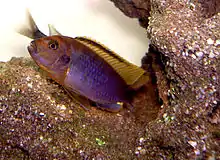Iodotropheus
Iodotropheus is a small genus of cichlids endemic to Lake Malawi in east Africa. The genus is distinguished from other genera of mbuna by the upper lip which is usually connected medially to the skin of the snout by a frenum; by its small, terminal mouth; by the outer teeth of both jaws, which are unequally bicuspid and loosely spaced, the tooth shafts inclined slightly toward the jaw symphysis; by the anterior teeth of the upper jaw being much longer and more robust than the lateral and posterior teeth.[1] The rusty cichlid or lavender mbuna, Iodotropheus sprengerae is the most commonly encountered member of the genus in the aquarium trade.
| Iodotropheus | |
|---|---|
 | |
| Lavender mbuna, Iodotropheus sprengerae | |
| Scientific classification | |
| Domain: | Eukaryota |
| Kingdom: | Animalia |
| Phylum: | Chordata |
| Class: | Actinopterygii |
| Order: | Cichliformes |
| Family: | Cichlidae |
| Subfamily: | Pseudocrenilabrinae |
| Tribe: | Haplochromini |
| Genus: | Iodotropheus M. K. Oliver & Loiselle, 1972 |
| Type species | |
| Iodotropheus sprengerae Oliver & Loiselle, 1972 | |
Species
There are currently three recognized species in this genus:[2]
- Iodotropheus declivitas Stauffer, 1994
- Iodotropheus sprengerae M. K. Oliver & Loiselle, 1972 (Rusty cichlid, Lavender mbuna)
- Iodotropheus stuartgranti Konings, 1990
In the aquarium
Like all cichlids from Lake Malawi these cichlids are best maintained in hard, alkaline water. Iodotropheus are best kept in aquariums with volumes greater than 120 L (31.5 gallon).
References
- Oliver, M.K. and P.V. Loiselle (1972). A new genus and species of cichlid of the mbuna group (Pisces: Cichlidae) from Lake Malawi. Revue de Zoologie et de Botanique Africaines, 85: 309–320. PDF
- Oliver, M.K. and M.E. Arnegard (2010). A new genus for Melanochromis labrosus, a problematic Lake Malawi cichlid with hypertrophied lips (Teleostei: Cichlidae). Ichthyological Exploration of Freshwaters, 21 (3): 209-232. PDF
- Froese, Rainer and Pauly, Daniel, eds. (2013). Species of Iodotropheus in FishBase. February 2013 version.